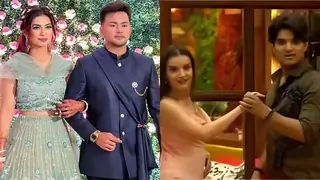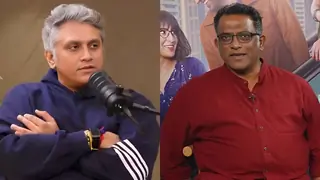Originally posted by: sashashyam
My dear Lashykanna,
Here I am, probably only a whisker ahead of your Chapter 9. It is not yet up as I begin this, but it might very well be up and running before I get done with it by Sunday. So, by way of ample precaution, I had better register myself right away, like a factory worker punching in his attendance!😉
OK, the last time, I devoted a good bit of my 2 pages+ to an analysis of your exquisite Heera (and the painting you have chosen for your Chapter 9 is exquisite too!) , so when I started with Chapter 7, it was she who was most on my mind.
But I see, you clever imp, that you have learnt the trick of keeping your readers on edge with anticipation by limiting the screen, or page time of your heroine! These 2 chapters have her in 3 scenes, true, but the second has far more of the maids and, indirectly, of the Khan Sahib than of Heera . Then the last has been left hanging in the air, albeit with Heera having , by a smooth verbal sleight of hand, managed to place her vis a vis, our hero, at a distinct disadvantage.
So I at least was left hoping that Chapter 9 would begin with the rest of this scene, and not jump to Mahendra or Khalil!
Partial revelations: What actually happens remains to be seen, but I was glad, Lashykanna, to note your commitment to gender equality😉, manifested here thru a good bit of space given over to our hero, Akbar Mahmoud Khan, whether directly or indirectly.
It is space put to excellent use, for he emerges still a mystery - which is as it should be - but with tantalizing bits and pieces of his persona bobbing up, like the delicious dumplings in a malai kofta.
So we get his brief life history, from a homeless , resourceless 19 year old burning with the will to succeed, and equipped with the grit, determination, the intelligence and the street smartness needed for getting there. You have carefully left out details of why he was without a home, a family or resources; that will undoubted come much later. Nor have you mentioned how he got started in a business that must have needed at least some start up capital. Racing horses is not called the sport of kings for nothing, and raising them cannot be far behind!
But never mind, it is a most satisfactory rags to riches tale, and we end up with two noble, magnificent, haughty, turbulent creatures, linked by a symbiotic understanding each of the other, uncontrollable except by each other, trusting and loving no one unconditionally except each other.
No, no, folks, not Akbar and Heera. Akbar and his Bahadur. They are a perfect couple, a splendid masterful man, and his equally splendid equine companion - one could hardly pass Bahadur off as just Akbar's mount!
The perfect couple for the present, be it understood!
As always, your brilliant analysis! I read with great interest!
Of course - the steed! Nobody can be more loyal and more beautiful than a horse in his life. 😊 I think, the character of Akbar is such that (yes, he's strong, he is a shield and armor for his family and friends), he needs not a weak girl who needs to be protected from everything, he needs a girl who will be becomes an equal and wise partner in his life - a lover-friend..
NB: I already detest the fledgling Akheera, which sounds like something out of
The Jungle Book. Lashykanna,
aapse atyant vinamra nivedan hai ki krupa karke is asahaneeya naam ka prayog na karein!
Nahin to yeh ati sheegra sab ki aadat ban jaayegi.😉😉 Shrewd, strict and yet sympathetic: He is all this, is our Akbar, and then some more.
The telling little scene where he anguishes over the foal in extremis is as moving as it is revealing. Especially the last bit, where, instead of having the poor suffering creature put speedily out of its misery and then erase it from his mind, as most owners would have done, he still wants to try and save it if at all this can be done. For him, the foal is not just an animal that could bring him profit down the line; it is a tiny life with which he feels a bond, a life that he is not willing to lose without trying his very best to save it.
Perhaps he has lost dear ones before and does not want to lose any more. Whatever the truth about that, right now, Akbar loves his horses as he loves nothing and no one else, With that, as Goethe said about Kalidasa's Shakuntala, all at once is said. Except perhaps that Akbar has the capacity to care for another being, and even the capacity to love.
👏
He is a tough, strict master, which is as it should be, and he rules, as you have put it, thru gratitude, or awe, or fear. Sama, dana, danda, leaving out only one of Kautilya's options, bhed, which he has apparently not yet needed to have recourse to, However, I have not the slightest doubt that he would use that too very effectively should the occasion for it arise.
I rejoiced when told that Akbar is a shrewd judge of men and their capabilities. Without this vital talent, no man can become a leader, and no leader can last and rise.
He is capable of perceptive empathy and consideration for those he considers his own, viz his sending Ibrahim off home for a while to look up his ailing wife. And while there is no clear indication of this, methinks he gives the clumsy stable boy one more chance because he senses that Ibrahim feels he deserves it, and he trusts Ibrahim's judgement in spite of the contrary evidence at the moment.
Deliberate aloofness: In the unfinished scene with Heera, we are not told anything of how Akbar reacts to this new avatar of Ms. Hazel-Brown Eyes in her aristocratic regalia. But from his abrupt movements, from the pointed brusqueness of his 'I had to fix the bridge... and you were in the way... that's all...', and the obvious sarcasm in his earlier comments about Heera's hunars, one senses a self-defence mechanism, a wall that he has erected around himself, which he maintains so as to make sure that no one other than his inner circle comes anywhere close to him. It is not, at least not yet, that he is afraid that he will develop a softness for Heera. It is rather that this aloofness has by now become second nature to him.
This said, I also have a sneaking suspicion that Akbar was curious about the Sahiba, and wanted a closer look at her under what could have been called normal circumstances. Else, why would he not be able to understand a perfectly simple request for a bit of space in his garden for replanting her herbs when Heera conveys it thru Bajrang and Gokul? Why his suggestion that if she could wait in his reception room, he would join her? By now, this is not a suspicion, it is a near certainty!
Equally curious is his detailed and entirely unnecessary explanation to Heera of what his man was doing when passing on some money to another man behind the marketplace. He owes her nothing, and definitely no explanations. His behaviour here makes sense only if he was seeking to reassure her that he was not selling her out to the Shehzaade's /Khalil's men for thirty pieces of silver*. He is very likely not himself aware of why he wants to clear himself in her eyes, but the truth is that this is precisely what he seeks to do.
I also wondered whether his remark : I think it's wrong to punish a child for a parent's fault!, did not also refer to some tragic incident in his own past. Maybe, just maybe, that was what it did.
👏
*This was what Judas Iscariot was paid by the Romans for betraying Jesus Christ to them.
The Alchemist: The most enchanting scene in the whole of these 2 chapters is the one of Heera making up her potion for Mohan and Daya. It is a setting worthy of a Dutch Renaissance master, Rembrandt for choice, only their alchemists were invariably portly, bearded old men, not an unselfconscious enchantress with her mortar and pestle, and her precious box of herbs and bark.
The description in this passage is masterly; take a bow, Lashykanna!👏 One can almost see the vapours rising from the warm oil, almost smell the scent of the pounded mixture. This scene needs not words alone, but film. It is tailor-made for cinema, as is another to which I will come presently.
It is characteristic of Heera's gentle consideration for others that she does not let her fears for the injured guards show on her face. Similarly, while there is very likely another reason for this as well, she quickly scotches the fears of her servitors about her safety here in a stranger's mansion in a strange town, for she does not want them to fret themselves into a fever over what they would see as their failure to fulfil their responsibility towards her and for her safety.
Nascent protectiveness?: Heera is, very likely without realizing it herself, beginning to be protective of Akbar's image in the eyes of her entourage.
Thus, she is quick to explain, smoothly and rationally, to Mohan and Daya why Akbar had not, during their meeting in the forest, mentioned that he lived in Aidabad. If the sharp-eyed Gauri infers that Heera must have been thinking this out, and thinking about the Khan Sahib as well, she is perhaps the only one, including Heera, to spot this!
It is thus not surprising that it is Gauri who wonders how precisely the Khan Sahib had concluded that Heera was the baisa, and then that she was incapable of being rude. The skillful deceptiveness with which Heera deflects her question about this was so masterly that it gladdened my heart. Thank Heavens you are no Miss Goody Two Shoes, my girl!, I said to myself, and mentally patted her on her head in warm approbation!
To revert, when one of her maids is castigating the Khan Sahib for treating a stable boy harshly "for some petty reason", Heera is the one who extracts the information that the boy had been careless and had hurt one of the horses. Which would at once have made the punishment seem both merited and perfectly ordinary to all those present!
Even so, when Bajrang and Gokul report to her about the suspicious looking between behind the market place between one of Akbar's men and a stranger where money was very likely handed over, though her instinct tells her otherwise - as when she asks : Are you certain it wasn't a harmless meeting?' - she does not dismiss the possibility that they are being betrayed to Khalil . She thus takes the only possible precaution - of having one of them following the strange man at a safe distance. Our young lady might be developing a soft corner for the Persian Adonis, but she has her wits about her!
NB: It is difficult to understand why, if Akbar is betraying them to the Mughals, his man should be giving money to the Mughal stranger and not taking money from him, but I suppose that in the state of high tension in which Bajrang and the rest are, such a suspicion is automatic even if not rational.
Later, when Akbar is telling her what exactly happened there behind the marketplace, while a suspicious mind might have interpreted that as a cunning cover up, Heera listens to the note of sincerity, of candour in his voice as he speaks, and she believes him because her heart says so. And that "underneath the toughened armour which Akbar Mahmoud Khan always donned, lay a soft-spot, after all."
As the poet said so wisely, The heart has its reasons of which the mind has no knowledge.
NB: This reads much better in the original French: La coeur as ses raisons que la raison ne connait pas, with a pun on the word raison, meaning both reason and good sense.
Nascent curiosity: Heera is increasingly, and uncharacteristically, keen to learn everything she can about the mysterious Khan Sahib. Thus she not only does not object to the maids' chatter about him, but she also absorbs with patent interest Dhani's portrait of him a monkish recluse, rich, powerful, but disinterested in all that other men in his position would indulge in: not just marriage, but women, wine and even a hukkah! And woman-like, she even speculates later about a "life-changing incident" that might have made him so.
Though her breeding does not let her peep into the dining room of Akbar's mansion as she passes it, she readily listens to Bajrang's account of the scene inside, and then wonders whether Akbar hates Marwari food!😉
Masterly tactics: In her encounter with Akbar, Heera more than holds her own, and this with grace and subtlety. She is all candour when this is called for, as while explaining why she was checking him out. She is quick to apologise for this precautionary move, which might have otherwise seemed ungrateful.
The coup de grace comes e when she masters her sense of hurt at his abrupt comment that he had helped her in the canal only to get her out of his way, and gets her own back with the classic "I'll bear in mind to stick to the boundaries...' ...so, I don't inconvenience you, by coming in your way!'", that too smoothly, without the slightest hint of any resentment. I almost stood up and cheered: Atta girl! He had that coming!
And Akbar knows that, for once, he has been beaten by this chit of a girl.
👏
A born strategist: As for Heera's elaborate and meticulous plans to gather enough support from all the riyasats adjoining Parnagarh so that their voice could be effectively heard at the Mughal court, one has already grown to expect this from her. Still, that she can steel herself to do all this just 10 days after the horrors that befell her beloved Jiji and their household at the hands of a monster, speaks volumes about her grit and determination, and her sense of responsibility towards her heritage and towards those who depend on her. She has grown up all of a sudden, has our Heera, and I love her for it.
The double-edged sword: No, I am not referring to the Tahar made of European steel that the Shehzaade Aurangzeb is exulting over*. I mean Khalil, who is, for the prince, a double-edged sword, which can also cut the hand that holds it. Which is exactly what has happened this time, and the Shehzaade, like Queen Victoria, is not amused.
It is another matter that if Khalil had managed to get the original farman, the Shehzaade's anger might have been less acute. For all his expression of regret at what he feels should not have happened to Durga Sahiba, methinks that success in getting hold of Parnagarh would have swept away this feeling of guilt all too soon.
I would have believed the Shehzaade's regret to be sincere if he had condemned the crimes perpetrated by his henchman against a woman as haram, or a clear violation of Islamic tenets, for Aurangzeb was a staunch Muslim and one would have expected him to react on these lines. But he does no such thing.
So, as things stand, Aurangzeb now faces a scandal of huge proportions as the uproar among the Hindus gathers strength, and Parnagarh is as far from his grasp as ever. The only way out for him is to effectively disown Khalil and banish him to Kabul for the present, and that is what he does.
I think that Shahzade not has noble remorse. Just dirty deed became known. If the circumstances of the death of Durga would remained in secret, and nobody didn't know, or if Durga would fall into his harem, he would have had no claims to Khalil.
About violating Islamic tenets. When I was 10, I was very fond of books Raphael, Sabatini about captain Blood. Then I read a very interesting book about the history of piracy. There were even famous women-pirates - captains!
There's a chapter about the abduction and sale of women in Oriental harems and addressed the question "according to the rules of Islam you can not touch someone else's wife." But, everything was going according to the rule: "if really very want - can". There was added the comment to the rules that if a woman is not a Muslim ( giaur, pers. (gbr), Arab. (kfir) "infidel", another faith), then they can do with her all.
But then Khalil is like an unguided missile, and it is more than clear that even he sets out for Kabul as per the Shehzaade's express command, he will make many a detour, trying his best to erase the fallout of his "bad day". Heera and her entourage will have to keep a sharp lookout for his minions.
The titanic confrontation between Khalil and the Ustaad, with the Shehzaade as the umpire, is the stuff of cinema, and one can literally see the action as one reads. Lashykanna, you have made the page literally crackle with tension as the two of them struggle for the axe. It reads more like a taut film script, stretched almost to breaking point, than anything else, and I begin to think that you have missed your true vocation!👏👏
*NB:In medieval times, the finest swords in the world were from Damascus. These blades were made from wootz steel from southern India, ingots of which were shipped to the Middle East from the 3rd century AD to the 17th century. By the mid-18th century, these exports petered out, partly due to the suppression of Indian industry by the British colonialists, and the craft of making Damascus steel blades also slowly disappeared.
The Damascus blade could cut thru a steel tube, a silk scarf let fall on it, or even a single hair with equal ease. It is not possible to duplicate these Damascus blades today, for the technique of making them has been lost, but modern research findings in 2006 have shown the presence of nanowires and carbon nanotubes in the Damascus sword blades.
I do not know which European steel the Shehzaade is referring to with such awe. Probably Toledo steel, which was exceptionally hard, though blades made from it were not as sharp as the Damascus blades.
Toledo steel dates back to over 2000 years ago, and swords made from it were used by the army of Hannibal , the Carthagian general, in the 3rd century BC, and then by the Romans as well. its extraordinary hardness made swords made of Toledo steel an invincible force in the hands of an expert swordsman, and this was well known to European armies. But Toledo steel took very long to manufacture, and so short swords of that steel, which used less material and could be manufactured more speedily, were favoured over the long swords or sabres. Probably the latter weapons were sourced from Damascus.
Question: If Durga had a fake farman at hand, why did she not pretend to be scared of Khalil and hand it over after a show of mild resistance? Then she might have escaped the horrors that were inflicted on her, and would have gained time, for Khalil would not have known the farman was fake till he got back to Agra. Meanwhile, Durga and Heera could have escaped from Parnagarh exactly as Heera does now. I know you will say that without the horror of what happened to Durga, much of the resistance that is to develop would not have materialised. But that is for your story. What of Durga the character? Why did she not take this escape route?
Good Lord! This is frightful! I have to call a halt to this pronto. Bye, Lashykanna, and bye the rest of you folks as well. I hope you have survived this in reasonably good shape!😉😉 The saving grace is that the next one is not due for another 2 weeks!
Shyamala/Aunty/Akka/Di





























627